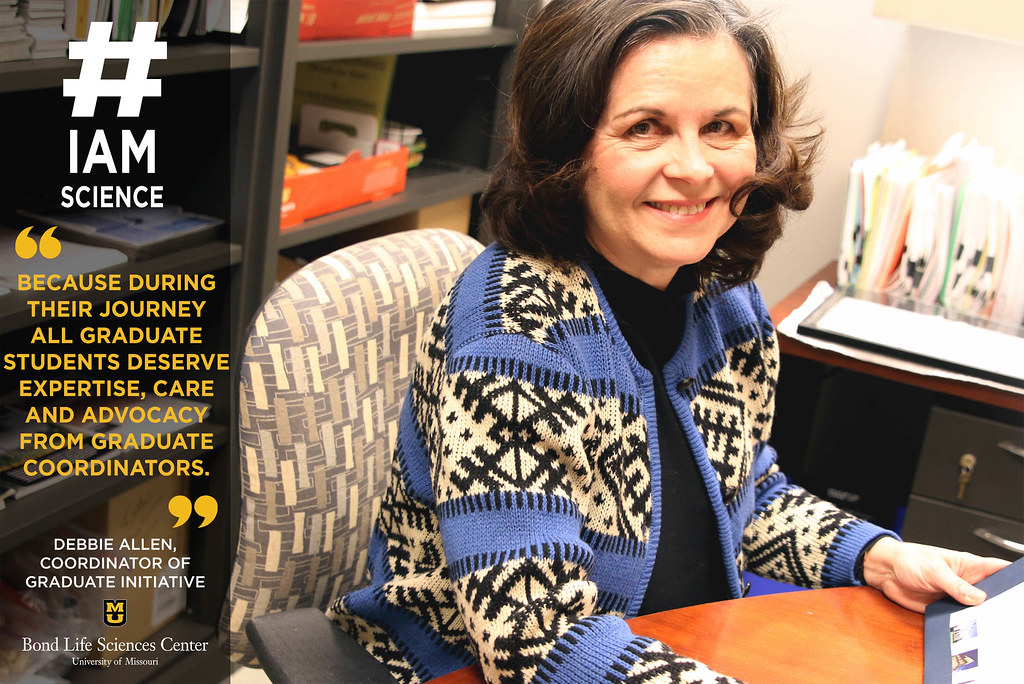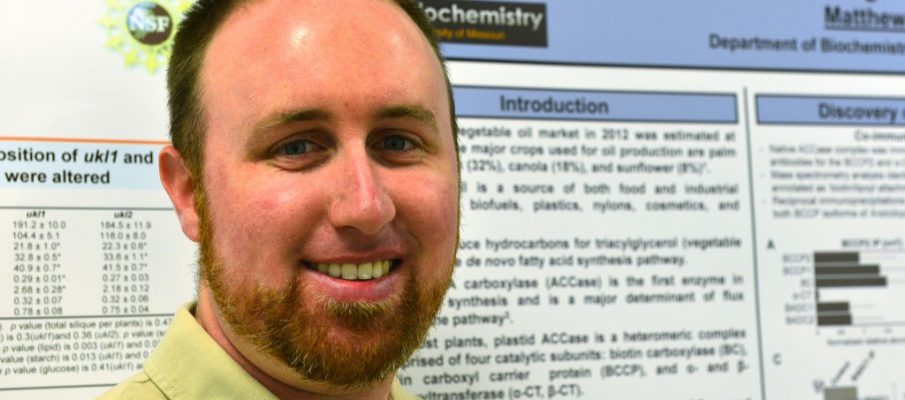Matthew Salie would like to see chubbier plants.
“You’ve probably never really seen a fat plant before, right?” said Salie, a fourth year MU graduate student in biochemistry. “Humans, we make plenty of extra fat and store that as energy. But plants don’t really need to do that — they make just as much as they need, and that’s about it.”
Salie studies plant metabolism with Bond LSC researcher Jay Thelen, an associate professor of biochemistry. He’s one of 25 winners honored for research presented during Missouri Life Sciences Week 2015.
The Thelen lab looks for ways to increase the amount of vegetable oil that crops such as corn and soybean can produce. Salie focused on an enzyme that is the first step in the pathway to producing fatty acid in plants.
The idea was that if he could reduce metabolic limits at the beginning of the process, then the downstream production of oil would increase.
“I found these new proteins that no one has ever really studied before,” Salie said. “As I started to look into them over the last year or two, it turns out that they actually seem to incorporate themselves into the enzyme and slow down it’s activity.”
Four separate proteins normally combine to form the functional enzyme, but the new proteins Salie identified mimic those components and can take their place, like a cuckoo bird replacing another species’ eggs with its own. The more mimics that replace proteins, the fewer functional enzymes the plant produces, which means less oil.
It’s a simple, nuanced way for the plant to fine-tune the production of fatty acids.
“Instead of being an on-off switch, it’s more like a thermostat,” Salie said. And if he can adjust that thermostat in a plant, it should start packing on the pounds.
Although Salies work was only recently submitted for publication, it’s already receiving recognition. His poster, “The BADC proteins — a novel paradigm for regulation of de novo fatty acid synthesis in plants,” won first place in the Molecular and Cellular Biology category during the Life Sciences Week poster competition in April.
Salie relished the opportunity to share his findings with researchers and non-scientists alike.
“It’s a great experience, because it helps you realize what’s really important about the work that your doing,” he said. “It also really encourages you to work harder. It’s like, ‘Wow, this is actually meaningful stuff!’ which can be hard to see when you’re working 60 or 70 hour weeks at the lab, just sitting there by yourself.”
Salie was among more than 300 students who presented their research during the 31st annual Life Sciences Week poster sessions.
The winners in each of the five categories are:
- Molecular and Cellular Biology
- Matthew Salie, Matthew Muller, Stephanie Bowers
- Organismal Biology
- Miqdad Dhariwala, Ryan Sheldon, Carine Collins
- Genetics, Evolution and Environment
- Julianna Jenkins, Nathan Harness, and a tie for third between Sharon Kuo and Susheel Bhanu Busi
- Life Science and Biomedical Engineering Technologies and Informatics
- Jamie Hibbard, Hang Xu, Brittany Hagenhoff
- Social and Behavioral Sciences
- Vaness Cox and Ian George tied for first place
Undergraduate winners are Vincent Farinella, James Mrkvicka, Anette van Swaay, Romanus Hutchins, Dallas Pineda, Kelsey Boschert, Anthony Onuzuruike, Clare Diester, Adam Kidwell and Sean Rogers.
Honorable mention:
- Social and Behavioral Sciences
- Undergrad Honorable Mention – Kelsey Clark
- Undergrad Honorable Mention – Louie Markovits
- Genetics, Evolution, and Environment
- Grad Honorable Mentions: Megan Murphy (Schul) and Amanda Smolinsky (Holliday)
- Undergrad Honorable mention: Anthony Spates (Holliday)
- Organismal Biology
- Grad Honorable Mention: Kathleen Pennington
- Grad Honorable Mention: Kasun Kodippili
- Grad Honorable Mention: Christopher Tracy
- Undergrad Honorable mention: Chelsie Todd
- Undergrad Honorable mention: Holly Doerr
- Undergrad Honorable mention: Zeina Zeida
- Molecular and Cellular Biology
- Grad Honorable mention, Khalid Alam [Burke lab]
- Grad Honorable mention, Zhe Li [Sarafianos lab]
- Undergrad Honorable mention: Vincent Markovitz [Guo lab]
Additional prizes were awarded for communication prowess and poster design chops.
For photos of some of this year’s winner, check out this Flickr album



